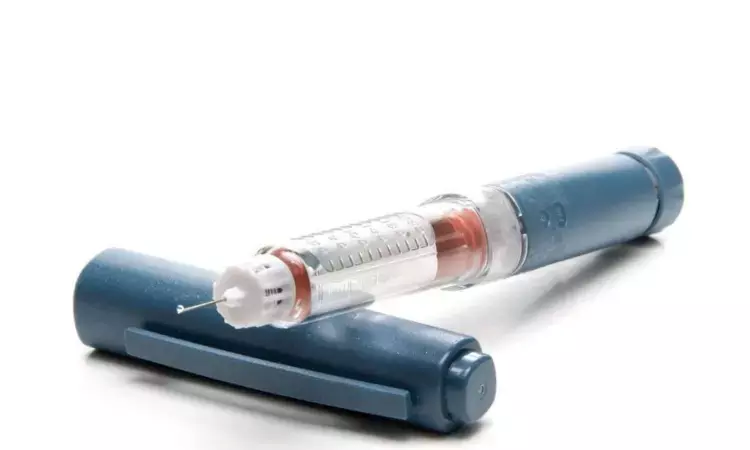- Home
- Medical news & Guidelines
- Anesthesiology
- Cardiology and CTVS
- Critical Care
- Dentistry
- Dermatology
- Diabetes and Endocrinology
- ENT
- Gastroenterology
- Medicine
- Nephrology
- Neurology
- Obstretics-Gynaecology
- Oncology
- Ophthalmology
- Orthopaedics
- Pediatrics-Neonatology
- Psychiatry
- Pulmonology
- Radiology
- Surgery
- Urology
- Laboratory Medicine
- Diet
- Nursing
- Paramedical
- Physiotherapy
- Health news
- Fact Check
- Bone Health Fact Check
- Brain Health Fact Check
- Cancer Related Fact Check
- Child Care Fact Check
- Dental and oral health fact check
- Diabetes and metabolic health fact check
- Diet and Nutrition Fact Check
- Eye and ENT Care Fact Check
- Fitness fact check
- Gut health fact check
- Heart health fact check
- Kidney health fact check
- Medical education fact check
- Men's health fact check
- Respiratory fact check
- Skin and hair care fact check
- Vaccine and Immunization fact check
- Women's health fact check
- AYUSH
- State News
- Andaman and Nicobar Islands
- Andhra Pradesh
- Arunachal Pradesh
- Assam
- Bihar
- Chandigarh
- Chattisgarh
- Dadra and Nagar Haveli
- Daman and Diu
- Delhi
- Goa
- Gujarat
- Haryana
- Himachal Pradesh
- Jammu & Kashmir
- Jharkhand
- Karnataka
- Kerala
- Ladakh
- Lakshadweep
- Madhya Pradesh
- Maharashtra
- Manipur
- Meghalaya
- Mizoram
- Nagaland
- Odisha
- Puducherry
- Punjab
- Rajasthan
- Sikkim
- Tamil Nadu
- Telangana
- Tripura
- Uttar Pradesh
- Uttrakhand
- West Bengal
- Medical Education
- Industry
Liraglutide increases insulin sensitivity independent of weight loss in obese diabetics

USA: A recent study published in Diabetes has shown weight loss-independent effect of liraglutide on insulin sensitivity in individuals with obesity and prediabetes. Liraglutide is a glucagon-like peptide-1 receptor (GLP-1R) agonist, a member of a class of medication used to treat type 2 diabetes and obesity.
Insulin sensitivity is how responsive cells are to insulin, an essential hormone that controls blood glucose levels. An increase in insulin sensitivity means insulin can more effectively lower blood glucose. Reduced insulin sensitivity or insulin resistance is a feature of Type 2 diabetes. Thus, improved insulin sensitivity can reduce the risk of developing Type 2 diabetes or improve its treatment.
GLP-1R agonists are medications that influence metabolism, such as decreasing blood sugar levels by promoting insulin secretion. Dipeptidyl peptidase 4 (DPP-4) inhibitors block the degradation of the body’s endogenous GLP-1, as well as other peptide hormones such as glucose-dependent insulinotropic peptide (GIP).
“We know that GLP-1R agonists promote weight loss, but we were surprised to find that the GLP-1R agonist liraglutide also has rapid effects on insulin sensitivity, independent from weight loss,” said Mona Mashayekhi MD, PhD, assistant professor of Medicine in the Division of Diabetes, Endocrinology and Metabolism. “This effect requires activation of the GLP-1 receptor, but increasing the body’s own endogenous GLP-1 through the use of the DPP4 inhibitor sitagliptin does not achieve similar effects.”
“Our research suggests that liraglutide, and presumably other GLP-1R agonists, are having important metabolic effects in a way that’s different from increasing endogenous GLP-1 levels, even though they’re using the same receptor. Future research will focus on potential mechanisms of how GLP-1R agonists are improving insulin sensitivity independent of weight loss.”
Eighty-eight individuals with obesity and pre-diabetes were randomized for 14 weeks to receive the GLP-1R agonist liraglutide, the dipeptidyl peptidase 4 (DPP-4) inhibitor sitagliptin, or weight loss without drug using a low-calorie diet.
To further investigate the GLP-1R-dependent effects of the treatments, the GLP-1R antagonist exendin and a placebo were given in a two-by-two crossover study during mixed meal tests. Crossover studies allow the response of a subject to treatment A to be compared with the same subject’s response to treatment B.
Liraglutide was shown to rapidly improve insulin sensitivity as well as decrease blood glucose within two weeks of beginning treatment and before any weight loss.
“GLP-1R agonists are an exciting class of medications, given their strong glucose-lowering effects combined with tremendous weight-loss benefits, and they have transformed how we manage diabetes and obesity in the clinic,” Mashayekhi said. “Since the number of medications in this class is rapidly expanding, a deeper understanding of the mechanisms of benefit is crucial so we can design the right drugs for the desired effects in the right patients.”
The investigators’ prior research demonstrated that liraglutide, but not sitagliptin or diet, improves measures of heart disease and inflammation. This matches the clinical findings of reduced cardiovascular disease with GLP-1R agonist treatment.
Future studies will continue to explore both receptor- and weight-loss-dependent effects of GLP-1R agonists in humans.
Reference:
Mona Mashayekhi, Hui Nian, Dustin Mayfield, Jessica K. Devin, Jorge L. Gamboa, Chang Yu, Heidi J. Silver, Kevin Niswender, James M. Luther, Nancy J. Brown; Weight Loss–Independent Effect of Liraglutide on Insulin Sensitivity in Individuals With Obesity and Prediabetes. Diabetes 1 January 2024; 73 (1): 38–50. https://doi.org/10.2337/db23-0356.
Dr Kamal Kant Kohli-MBBS, DTCD- a chest specialist with more than 30 years of practice and a flair for writing clinical articles, Dr Kamal Kant Kohli joined Medical Dialogues as a Chief Editor of Medical News. Besides writing articles, as an editor, he proofreads and verifies all the medical content published on Medical Dialogues including those coming from journals, studies,medical conferences,guidelines etc. Email: drkohli@medicaldialogues.in. Contact no. 011-43720751


